From Pinochet To Assange: A Tale Of Two Extraditions
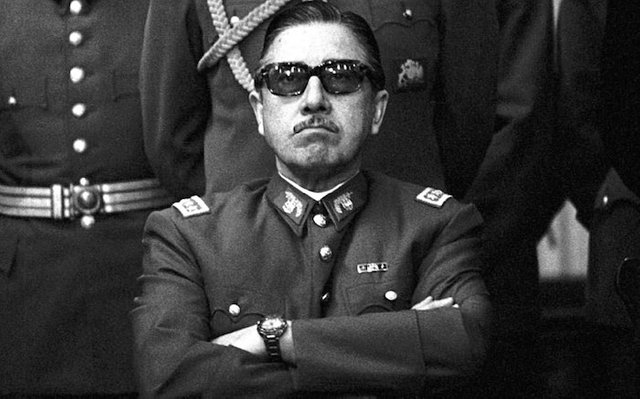.jpg)
This article is my own intellectual property and was originally published with Disobedient Media.
The plethora of crimes committed during the military dictatorship of Augusto Pinochet in Chile between 1973 and 1990 were exactly the type of abuse of power that Julian Assange would uniquely expose through Wikileaks. Both Assange and Pinochet have battled against extradition from the UK, with vastly different outcomes and contrasting positions taken by the UK government. Astoundingly, the UK supported Pinochet, a human-rights abuser, and persecuted Assange, a journalist who has exposed crimes of the powerful. Adding to this, the UK paid for the same barrister to defend Pinochet from extradition, and to later argue for Swedish authorities during their attempts to extradite Assange.
The reality of the UK's role in protecting a despot and prosecuting a journalist reveals the true face of a self-perpetuating, corrupt power structure which, based in part on the perception of freedom of the press, has falsely claimed moral authority on the world stage.
The more attention we pay to the facts and history surrounding the UK’s part in the arbitrary detention of Assange and the protection of Pinochet from exposure, the more evident the corruption becomes.
Julian Assange has never been publicly charged with a crime, much less convicted of one. Last year, Swedish authorities finally dropped their investigation, years after the UK successfully pressured Swedish authorities to string out the matter in 2013. Despite all of this, Julian Assange has remained arbitrarily confined by British authorities for almost six years, according to the findings of the United Nations Working Group on Arbitrary Detention (UNWGAD).
Despite two years having passed since the UNWGAD's findings, many remain unaware that the UK paid the prosecution costs of Sweden in its (now-withdrawn) attempt to extradite Julian Assange. As part of this, the UK paid for Clare Montgomery to be the legal representative of the Swedish government.
Counterpunch summed up the situation earlier this year: "...The last four years of Julian Assange’s effective imprisonment in the Ecuadorean embassy in London have been entirely unnecessary. In fact, they depended on a legal charade." Likewise, legal representatives of the WikiLeaks Editor-In-Chief have repeatedly called the UK's treatment of the publisher 'appalling' and "well short" of the rule of law.
When we contrast this well-recognized abuse of a politically imprisoned journalist with the UK's attempts to shelter a violent dictator like Pinochet, the ingrained hypocrisy of a Western power which pretends to uphold liberal ideals is exposed, revealing the deeply harmful reality of the machinations of power and its response to exposure.
The fact that UK Barrister Clare Montgomery was instrumental in the extradition battles of both Pinochet and Assange sharpens the bite of such critique, as does the observation that the costs of each proceeding were ultimately paid by the British public.
In other words: The UK paid legal fees for the defense of Pinochet against efforts to extradite him in light of severe human rights abuses, later paying the same barrister again to aid Sweden in its effort to extradite a journalist, Julian Assange, without charge. All this, in addition to paying for the costs associated with laying siege to the Ecuadorian embassy in London.
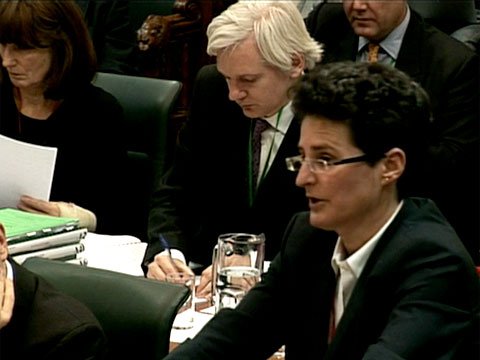
Clare Montgomery QC, right, pictured in court with Julian Assange, left
Costs incurred at the expense of the British public due to its ongoing illegal detention of Julian Assange are staggering. They have included not only the payment of a prosecuting barrister, but also general legal costs, a continual police presence surrounding the Ecuadorian embassy from June 2012 until late 2015, and 24/7 covert surveillance both before and since that date.
Clare Montgomery is not the only figure involved in Pinochet's fight against extradition to re-emerge in a contrasting role in Julian Assange's legal case. In a startling reversal of positions, while Pinochet's one-time defender served as the prosecutor of Assange on behalf of Sweden, Baltasar Garzón, the Spanish judge who had sought to extradite Pinochet from the UK to Spain, now defends the Wikileaks Editor-In-Chief as the head of his legal team.
At the time of writing, Garzón is expected to speak at an upcoming meeting of the United Nations Human Rights Council focused on the persecution of the WikiLeaks Editor-In-Chief.
The Independent described Garzón: "He tried to extradite General Pinochet, ordered the arrest of Osama bin Laden, put notorious members of the Argentinian junta, such as Adolfo Scilingo, behind bars and investigated the mass executions of nearly 150,000 Spanish Republicans under General Franco... Mr Garzón... is viewed by many as Spain's most courageous legal watchdog and the scourge of bent politicians and drug warlords the world over..."
In distilling this irony, it becomes apparent that while the UK used tax funds to overtly and covertly persecute a journalist, the UK also used public resources to safeguard a despot from extradition to face charges of abuse including genocide, rape, torture and murder. This fact alone gives the lie to the UK's projected image as a bastion of freedom, humanitarianism, freedom of the press, and liberal ideals in general. It also demonstrates that it is not only Assange and the citizens of Chile who suffer from this variety of tangible hypocrisy, but also the citizens of the UK whose public funds are wasted in such a damaging manner.
In 2015, Wikileaks pointed out Clare Montgomery's role in both defending dictators and prosecuting truth-tellers via Twitter:
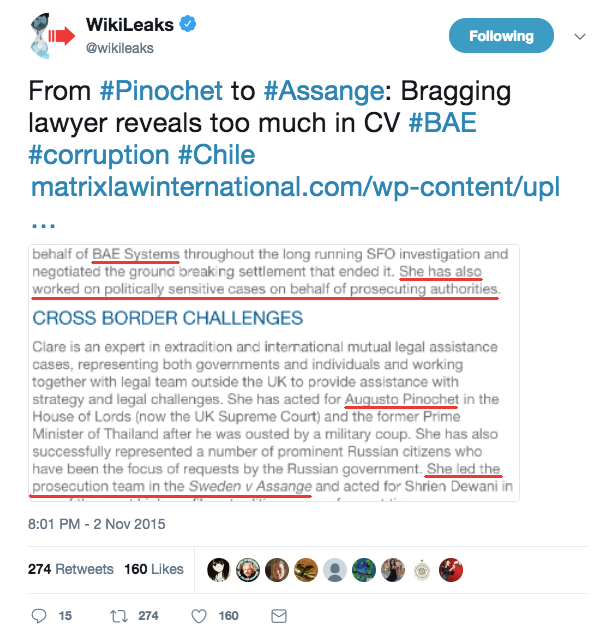
The copy of Clare Montgomery's CV initially linked by WikiLeaks relates her representation of not only Pinochet, but also the former Prime Minister of Thailand after he was: "Ousted in a military coup," before writing that she led the prosecution team in Sweden v Assange. Her contrasting arguments in Assange and Pinochet's case crystalize the self-protective hypocrisy of western powers.
The BBC reported Montgomery's defense of Pinochet, relating her argument that torture committed by his regime should not be considered criminal acts. Documents made available by the House of Lords describe Montgomery's efforts to minimize Pinochet's atrocities, stating: "It was suggested by Miss Montgomery, for Senator Pinochet, that although torture was contrary to international law it was not strictly an international crime in the highest sense."
In an article titled: "Torture is not an international crime, say Pinochet defense," The Guardian also observed Montgomery's argument for torture to be considered acts of state which could not be punished. Another piece from The Guardian recount Montgomery's arguments made on behalf of the dictator:
"The former Chilean dictator Augusto Pinochet was immune from prosecution outside his homeland because the crimes and human rights abuses he is alleged to have committed fell under the category of "acts of government", the House of Lords heard... Clare Montgomery QC told the panel of seven law lords that as a head of state he was entitled to "absolute immunity", even if the charges at the centre of the allegations included torture. "States and the organs of state, including heads of state and former heads of state, are entitled to absolute immunity from criminal proceedings in the national courts of other countries," she said."One cannot help but observe that Montgomery's arguments on behalf of Pinochet go to the heart of the issues that Wikileaks would eventually expose: namely, human rights abuses by the powerful and by states against the public and the powerless. Montgomery's legitimization of Pinochet's abuses as an extension of sovereignty, combined with her later efforts to prosecute Assange, is symbolic in a broader sense of the system of power protecting itself.
As reported by The World Socialist Website, UK authorities ultimately moved to halt extradition proceedings against Pinochet, allowing him to return to Chile: "Since October 1998 Pinochet has been fighting extradition to Spain on 35 charges of torture and conspiracy to torture brought forward by Spanish Judge Baltasar Garzón. The pretext for halting the proceedings against him by the end of next week was provided by a medical report on Pinochet's health. The four doctors who examined him for six hours on January 5 claimed he was too ill to stand trial in Spain. The Home Office said the "unequivocal and unanimous" conclusion of the doctors was that Pinochet was "at present unfit to stand trial and that no change to that position can be expected."
It boggles the mind to compare the clemency extended to Pinochet for health reasons, while UK authorities ignore the warnings from multiple physicians that Julian Assange's health is clearly in a dangerous condition. A politically imprisoned journalist has received no reprieve, even after rulings by the United Nations were made in his favor and Sweden's investigation, which prompted the initial fight over extradition, had ended. Nevertheless, a dictator who ordered torture and murder of his own citizens was protected from extradition due to 'health' reasons.
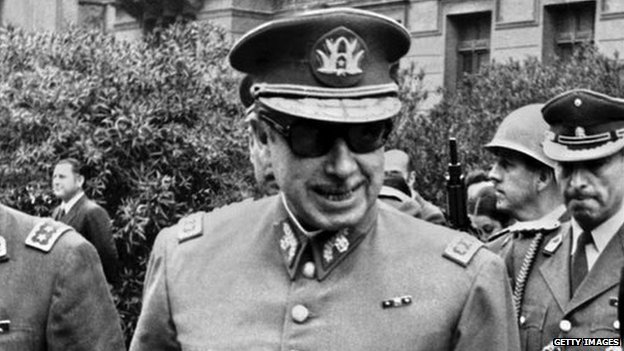
Image: Getty Pictured: Augusto Pinochet
In order to fully grasp the significance of the reversed positions taken by the UK and the litigators involved with the extradition battles of Pinochet and Assange, we must review the acts of brutality committed by Pinochet's regime, and his close ties to the UK and US establishments.
The Californian outlet SFGate reports that President Nixon's administration paved the way for Pinochet's 1973 coup by aiding in the destabilization of Chile under Salvador Allende, "the world's first democratically elected Marxist President." The article goes on to describe the fundamental impetus driving the United States and Western efforts to undermine Allende's government:
"... Declassified U.S. government documents have shown that the Nixon administration began a program to destabilize the Allende government, which had earned President Richard Nixon's wrath by nationalizing U.S. copper mines and other foreign-controlled businesses, rural estates and banks and recognizing Cold War foes of the United States such as Cuba, North Korea and North Vietnam. Led by Secretary of State Henry Kissinger, Washington financed labor strikes, propaganda and military plotters, paving the way for Pinochet's rise to power, some historians have argued."
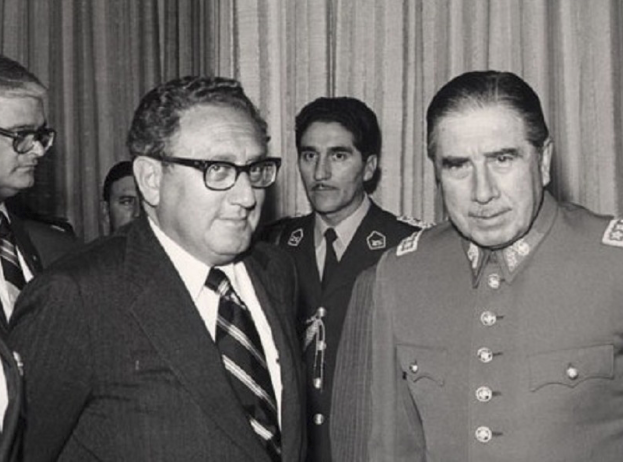
Henry Kissinger, left, with Augusto Pinochet, right.
The Independent related the words of a witness to Pinochet's atrocities: "It seems to me that one of the reasons for the [Caravan of Death] mission was to set a drastic precedent in order to terrorize the presumed willingness of the Chilean people to fight back."
With Pinochet installed, Chile was once again open for US business interests, and a potential ally of communist states was thwarted. The relationship that would develop between Pinochet and prominent figures from the UK and the US, including Margaret Thatcher and Henry Kissinger, may have also set political precedent for the UK's defense of Pinochet from extradition.
How could one reasonably expect the UK judicial system to punish Pinochet, after its government under Cold-War era conservative Margaret Thatcher had expressed remarkable closeness with the dictator during the height of his regime?
The Independent wrote of Thatcher's fondness for Pinochet:
"During her time as Prime Minister, Margaret Thatcher openly called a terrorist a "true friend," invited a terrorist into her home for tea, and personally lobbied against a terrorist's prosecution for war crimes. Thatcher's support for Chile's former torturer-in-chief General Pinochet is no secret; it was something she was proud of. Despite her assertion that “The United States and Britain have together been the greatest alliance in defence of liberty and justice,” Thatcher refused to back down in her support of a man who overthrew a democratically elected government. This was a man who initiated the notorious Caravan of Death, the army unit that travelled the country by helicopter, murdering and torturing the General's opponents."Other press reports have illustrated the close ties between the Pinochet regime and Thatcher's government. Even establishment press outlets like CNN characterize the bond between Thatcher and Pinochet as a "famously close relationship."
Such remarkably intense affection was also documented between Pinochet and officials from the United States, specifically regarding former Secretary of State Henry Kissinger. The Nation writes of his friendship with Pinochet:
" ... A declassified secret memorandum of a private conversation with Gen. Augusto Pinochet that took place in Santiago, Chile, in June 1976... reveals Kissinger’s expressions of “friendship,” “sympathetic” understanding and wishes for success to Pinochet at the height of his repression, when many of those crimes – torture, disappearances, international terrorism – were being committed."
The Nation goes on to quote Kissinger's reassurance of US tolerance of Pinochet's government:"We welcomed the overthrow of the Communist-inclined government here. We are not out to weaken your position.” The dialogue between Kissinger and Pinochet, as well as the despot's friendship with Thatcher, illustrates the dominance of the realpolitik value system in Western nations, through which human rights abuses became an afterthought in comparison with perceived geopolitical advantage.
The atrocities of Pinochet's regime, so easily ignored by Kissinger and Thatcher, began during the autocrat's violent takeover. SFGate relates the violence that descended on Chile, thanks at least in part to US destabilization efforts:
"Thousands of leftists were arrested, tortured and executed in Santiago's National Stadium... and on military bases and naval ships. Bodies were dumped into mine shafts, unmarked graves and the Pacific Ocean. An estimated 1 million people were forced into exile and 28,000 were tortured... In 1992, a truth commission found the 17-year Pinochet regime (1973-1990) responsible for the death or disappearance of 3,197 people. In fact, some scholars have credited Pinochet with introducing the term "disappeared" to the lexicon of modern politics."
HumanRightsHistory defines the term "enforced disappearance," a phrase associated with Pinochet's regime, among others, in the following terms:
"Enforced disappearance is defined by the treaty as “the arrest, detention, abduction or any other form of deprivation of liberty by agents of the State or by persons or groups of persons acting with the authorization, support or acquiescence of the State, followed by a refusal to acknowledge the deprivation of liberty or by concealment of the fate or whereabouts of the disappeared person, which place such a person outside the protection of the law.”
It is a haunting, almost poetic realization that the UK has enacted a slow-motion version of an 'enforced disappearance' of Julian Assange. The publisher has been arbitrarily detained, deprived of liberty and by agents of the State, combined with the refusal to acknowledge that same deprivation of liberty, placing him in a very real sense, outside the protection of the law.
How can we view the ongoing silence from within the confines of the Ecuadorian embassy as anything other than a political, enforced disappearance in the middle of a so-called free, liberal society? Though Assange's isolation is enforced by Ecuador, it is no doubt taking place in the face of undue pressure on Ecuador from the US and the UK. This can be seen again in the CIA's response to the submission of a FOIA request, in which the CIA explained that it could neither confirm nor deny the existence of plans to assassinate Julian Assange.
Essentially, the treatment of the West's most prominent political prisoner echoes the horrors of Pinochet's government, the same regime who birthed the phrase "enforced disappearance" into the political lexicon, and whose brutal leader was eventually defended by the UK. Clare Montgomery's involvement in Assange's legal battle then takes the irony of the judicial role-reversal to an entirely new level.
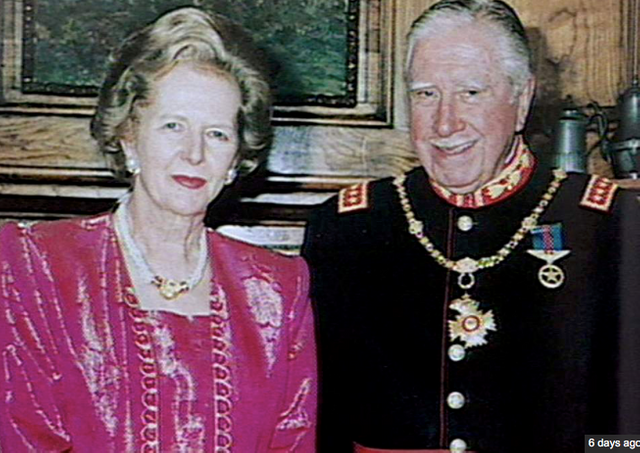
Thatcher, left, with Augusto Pinochet, right.
The UK's current treatment of Assange has also been characterized as an effort to "make an example" for the public, and those who might rebut crimes committed by a deranged and political ruling class with the truth, as WikiLeaks has done. John Pilger writes, via Consortium News: "For the past decade, WikiLeaks has published groundbreaking evidence of government and corporate abuse while getting targeted for abuse itself, including a seven-year vendetta against founder Julian Assange."
Counterpunch likewise observed: "Again, the real crime Julian Assange committed was not breaching his bail conditions but daring to speak truth to power. WikiLeaks under his stewardship has become the bête noire of governments, particularly Western governments, revealing the ugly truth of crimes committed by US forces in Iraq, the West’s role in the destabilization of Ukraine in 2014, the destruction of Libya..."
With the historical context of Thatcher and Kissinger's personal and political relationships with Pinochet in mind, it becomes far less surprising that the UK has put extraordinary effort into getting Augusto Pinochet off the legal hook.
Overall, what does it tell us about the values of a supposedly liberal, Western democratic nation that its government would pay for the persecution and imprisonment of a journalist, despite repeated calls from the United Nations to free and compensate that same journalist, who is now very clearly suffering in solitary confinement as a political prisoner - while also having paid for the defense of a horrendous dictator? What does it say, that the UK had the gall to pay for the same barrister to prosecute Assange that had defended Pinochet on the grounds that acts of terror - genocide, murder, torture and rape - were unimpeachable when committed by a Head of State?
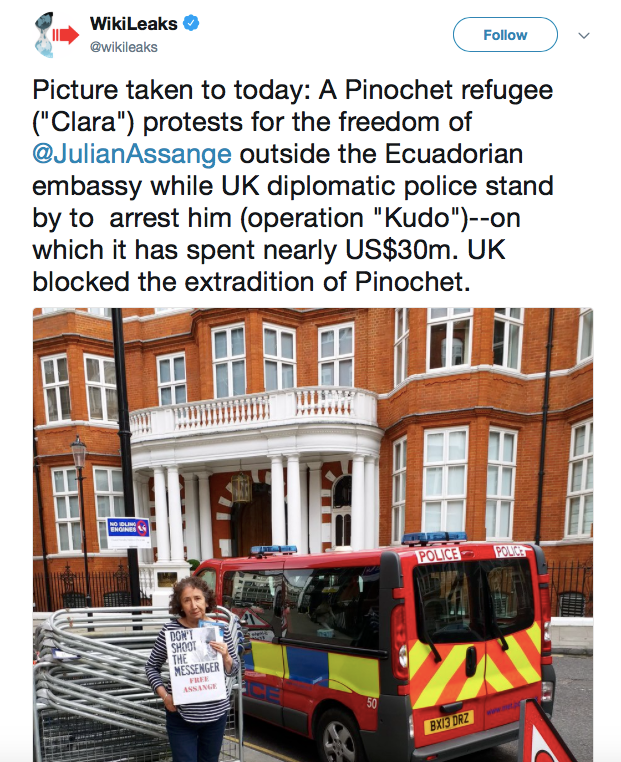
To answer these questions, we can figuratively redefine the UK's definition of "justice," interpreted in light of history to read something like the following:
"Justice is to defend the dictators and human rights abusers that benefit our political and economic interest, while prosecuting the journalists and whistleblowers we perceive to be against those same interests, without so much as a grimace at the hypocrisy of paying for the same barrister to defend a torturer and condemn a political prisoner."
Congratulations @elizbethleavos! You have completed some achievement on Steemit and have been rewarded with new badge(s) :
Click on the badge to view your Board of Honor.
If you no longer want to receive notifications, reply to this comment with the word
STOPTo support your work, I also upvoted your post!
Do not miss the last post from @steemitboard!
Participate in the SteemitBoard World Cup Contest!
Collect World Cup badges and win free SBD
Support the Gold Sponsors of the contest: @good-karma and @lukestokes
Curated for #informationwar (by @truthforce)
Our purpose is to encourage posts discussing Information War, Propaganda, Disinformation and other false narratives. We currently have over 7,500 Steem Power and 20+ people following the curation trail to support our mission.
Join our discord and chat with 150+ fellow Informationwar Activists.
Connect with fellow Informationwar writers in our Roll Call! InformationWar - Contributing Writers/Supporters: Roll Call Pt 8
Ways you can help the @informationwar
God bless you. https://steemit.com/@biblegateway
the sad thing is, people keep going along with their "democracy" they should be shutting down parliament instead.